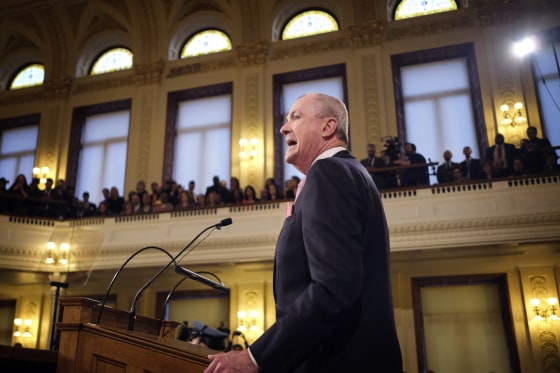New Jersey this week became the ninth state to ban the so-called gay and transgender panic defenses, joining Hawaii, California, Nevada, Illinois, New York, Connecticut, Maine and Rhode Island in barring the controversial legal strategy.
The bill was signed Tuesday by Gov. Phil Murphy, a Democrat, who said the law promotes “full equality for all our residents."
"Gay and trans panic defenses are rooted in homophobia and abhorrent excuses that should never be used to justify violence against vulnerable populations," Murphy said in a statement.
More than 30 percent of the United States population now lives in a state where the controversial legal strategy is banned, according to the Movement Advancement Project. While California was the first to bar the practice in 2014, six states have banned it in the past year.
The LGBT Bar, an LGBTQ legal nonprofit, has been on the forefront of getting the gay and trans panic defenses banned across the country. The organization defines the controversial practice as “a legal strategy that asks a jury to find that a victim’s sexual orientation or gender identity/expression is to blame for a defendant’s violent reaction, including murder.”
“It is not a free-standing defense to criminal liability, but rather a legal tactic used to bolster other defenses,” the group states on its website. “When a perpetrator uses an LGBTQ+ panic defense, they are claiming that a victim’s sexual orientation or gender identity not only explains — but excuses — a loss of self-control and the subsequent assault.”
The strategy is rare, but according to a 2016 report by the Williams Institute at UCLA Law, “the gay and trans panic defenses have appeared in court opinions in approximately one-half of the states” since the 1960s.
One of its best known uses was in the murder trials for the 1998 killing of Matthew Shepard. The lawyers for Aaron McKinney, one of two men charged, argued that McKinney was driven to a temporary state of insanity after Shepard allegedly made a sexual advance on him. Despite this, a Wyoming jury found him guilty and sentenced him to two consecutive life sentences.
In 2018, Democratic members of Congress introduced a bill that would ban gay and trans panic defenses in federal court. While the bill passed in the House, it did not advance in the Senate after Majority Leader Mitch McConnell did not bring it up for a vote.
New Jersey’s ban on panic defenses is not the first pro-LGBTQ legislation the state has passed since Murphy took office: The state now prints gender-neutral birth certificates, and its public school curriculum will start teaching students about LGBTQ people’s historical contributions.


